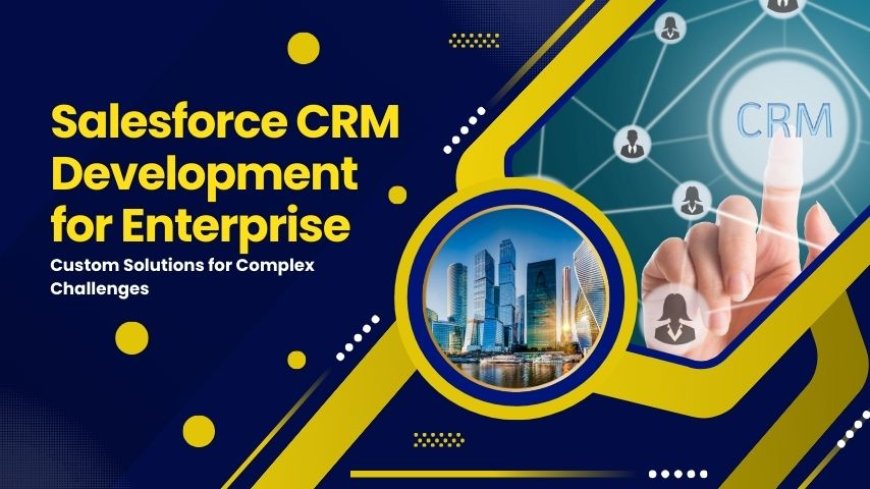Salesforce CRM Development for Enterprise: Custom Solutions for Complex Challenges
Discover how Salesforce CRM development offers custom solutions for enterprise challenges. Learn the importance of partnering with a Salesforce Development Company to enhance customer relationship management, improve data security, and streamline operations. Explore key features, benefits, and real-world applications of tailored CRM systems for complex business needs.

Customer Relationship Management (CRM) has evolved into a strategic asset for enterprises. For organizations managing complex customer interactions and data, an off-the-shelf CRM often lacks the flexibility and features needed. Salesforce, a leading CRM platform, allows enterprises to create custom solutions tailored to specific needs. In this article, we’ll explore the role of Salesforce CRM Development in addressing complex business challenges and why partnering with a specialized Salesforce Development Company can be essential for achieving optimal results.
The Growing Need for Custom CRM Solutions in Enterprises
Enterprises operate in competitive, data-driven environments that demand precise, efficient customer management. A standardized CRM system may work for small businesses but often falls short when scaled to enterprise levels. Here’s why enterprises increasingly turn to customized CRM software development:
-
Customer Data Complexity: Enterprises handle vast amounts of customer data across multiple regions, products, and services. Managing this data requires advanced features, robust integrations, and high customization.
-
Evolving Business Processes: Standard CRM tools may not accommodate unique workflows or adapt to industry-specific requirements.
-
Scalability Needs: Enterprises face frequent shifts in user numbers and transaction volumes, making scalability a critical factor.
According to a report by Grand View Research, the global CRM market size was valued at $58.82 billion in 2021 and is expected to grow at a compound annual growth rate (CAGR) of 13.3% until 2030. This growth highlights CRM’s increasing relevance for organizations, especially enterprises with complex customer interaction needs.
Why Salesforce for Enterprise CRM Solutions?
Salesforce stands out as a preferred CRM platform due to its adaptability, extensive features, and integration capabilities. With its suite of tools and cloud-based solutions, Salesforce offers a comprehensive approach to customer management.
-
Customization Potential: Salesforce’s modular architecture and AppExchange marketplace allow organizations to tailor functionalities to meet specific requirements.
-
Scalability: Salesforce supports enterprises of all sizes, from growing startups to global corporations. Its cloud infrastructure enables organizations to scale up resources as needed.
-
Data Security and Compliance: As data protection regulations expand, Salesforce provides built-in security features, ensuring enterprises remain compliant.
-
Comprehensive Analytics: Salesforce CRM includes advanced analytics, helping enterprises turn raw data into actionable insights that drive business growth.
With these advantages, Salesforce serves as an ideal foundation for custom CRM development. A specialized Salesforce development company can help businesses leverage these benefits through custom integrations, workflows, and applications.
Key Features of Custom Salesforce CRM Development
When developing a Salesforce CRM for an enterprise, the solution must include a range of custom features tailored to industry-specific challenges. Here are some key components that define a powerful, customized Salesforce CRM system:
1. Advanced Data Management and Custom Reporting
Data management is central to CRM. Salesforce allows developers to create custom fields, data objects and reports that capture and process the specific data enterprises need. Custom reporting offers a more granular view of business activities and outcomes.
Example: A multinational retail company can use custom fields to manage product-specific customer interactions across regions, enabling comprehensive tracking and personalized customer service.
2. Integration with Third-Party Systems
Enterprises rely on multiple software tools, from ERP systems to marketing automation platforms. Salesforce’s open APIs make it possible to integrate with external applications, creating a unified, seamless experience.
Example: Integrating Salesforce CRM with an ERP system allows for synchronized data on inventory and sales, reducing operational silos and enabling accurate, real-time data sharing.
3. Customizable Workflows and Automation
Automating routine tasks helps organizations save time and resources. Customizable workflows in Salesforce automate essential processes, from lead tracking to contract renewals.
Example: Automated workflows can assign leads to specific sales teams based on criteria like region or product line, increasing efficiency and improving lead response times.
4. Role-Based Access Control and Data Security
Security is essential in any CRM. Role-based access controls restrict data visibility to authorized personnel, which helps prevent unauthorized data access.
Example: A financial services company can restrict access to customer financial records to a specific team, ensuring data privacy and compliance.
For a detailed guide on custom CRM solutions and their benefits, refer to this article: A Guide to Custom CRM Software Development.
Challenges in Implementing Salesforce CRM for Large Enterprises
Despite Salesforce’s flexibility, developing a CRM for enterprise use is complex and requires a detailed approach to overcome common challenges:
1. Data Migration and Integration Complexity
Migrating data from legacy systems to Salesforce can be challenging, especially with large data volumes. Ensuring data consistency and integrity during migration requires careful planning and testing.
Solution: Partnering with an experienced Salesforce development company is crucial to ensure seamless data migration without data loss or inconsistencies.
2. User Adoption and Training
Enterprise CRM systems involve many users with varying levels of technical expertise. Ensuring that all users can effectively use the system is essential for maximizing ROI.
Solution: Custom training programs and intuitive UI/UX design can enhance user adoption and streamline daily CRM tasks.
3. Balancing Customization with System Performance
Over-customizing can impact system performance, particularly if the CRM becomes too complex. Balancing features with performance requires thoughtful planning and ongoing monitoring.
Solution: Regular performance audits and testing help ensure that the CRM operates smoothly, even with high customization.
Benefits of Partnering with a Salesforce Development Company
Working with a specialized Salesforce development company brings a wealth of advantages, ensuring that CRM customization aligns with both technical requirements and business goals.
-
Industry Expertise: Salesforce development companies often specialize in specific industries, such as finance, healthcare, or retail, enabling them to deliver targeted solutions.
-
Efficient Project Management: A development company manages the project end-to-end, from discovery to deployment, which minimizes operational disruptions.
-
Ongoing Support and Maintenance: Post-deployment support is essential, especially as new features are introduced. A development partner provides ongoing maintenance and support to address technical issues.
-
Cost-Efficiency: Although custom CRM solutions require an initial investment, a Salesforce development company helps optimize costs by delivering efficient, tailored solutions.
Statistics on CRM Development and Salesforce Adoption
-
According to Salesforce, 83% of Fortune 500 companies use Salesforce, underscoring its role in supporting complex business requirements.
-
A survey by Nucleus Research found that for every dollar spent on CRM, enterprises achieve an average return of $8.71.
These statistics illustrate the significant impact CRM has on business operations, especially for enterprises that need advanced features and scalability.
Custom Salesforce CRM in Action: Real-World Applications
Example 1: Enhanced Customer Service for a Telecommunications Provider
A telecommunications company needed a customized CRM to manage customer interactions, technical support, and contract renewals. By implementing Salesforce with custom workflows, the company automated ticket routing to reduce response times and enhance customer satisfaction.
Example 2: Sales Automation for a B2B Manufacturing Enterprise
A B2B manufacturing company requires a CRM system to manage complex sales cycles. Using custom Salesforce development, the company created automated workflows to nurture leads and track sales progress across multiple regions. The system allowed sales teams to access real-time data, improving decision-making and increasing conversions.
Key Takeaways for Enterprises Considering Salesforce CRM Development
Enterprises considering Salesforce CRM should weigh the following factors:
-
Customization Needs: Identify specific workflows, integrations, and data requirements before initiating CRM development.
-
Partner Selection: Choose a Salesforce development company with proven expertise and experience in the target industry.
-
Long-Term Maintenance: Plan for ongoing support and updates, especially as business needs evolve.
Conclusion
Salesforce CRM development offers enterprises the flexibility, scalability, and integration capabilities needed to manage complex customer interactions and data requirements. By partnering with a qualified Salesforce Development Company, enterprises can create custom solutions that address specific challenges and align with organizational goals. With features like customizable workflows, robust data security, and advanced analytics, Salesforce stands as a powerful tool in CRM software development.
As organizations continue to adopt Salesforce, the importance of custom solutions will only grow. An effective, customized Salesforce CRM can enhance customer satisfaction, improve operational efficiency, and drive significant business growth, making it a valuable investment for any enterprise.
What's Your Reaction?















![Noots Focus Reviews [Truth Exposed 2025]!](https://news.bangboxonline.com/uploads/images/202501/image_430x256_678e3b94881a1.jpg)
![Vivalis Male Enhancement: The Must-Know Ingredients [2025 Update]](https://news.bangboxonline.com/uploads/images/202501/image_430x256_678e3b54e396c.jpg)











